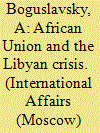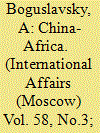| Srl | Item |
| 1 |
ID:
111936


|
|
|
|
|
| Publication |
2012.
|
| Summary/Abstract |
ARLY IN SEPTEMBER 2011, the forces of the National Transitional Council (NTC) of Libya backed, on a mass scale, by NATO assumed control over the larger part of the country and captured Tripoli. The regime change became a fact yet the country will have to tread a long and arduous road of rehabilitation of its now practically non-existent infrastructure and address a more important and even more challenging task of national reconciliation and revival of national unity. It seems that external military interference (far beyond the limits outlined by UN Resolution 1973) has made this dual task even harder to achieve. It caused unnecessary loss of civilian lives, stirred up hard feelings which pushed the east and west of the country apart, destroyed civilian objects and started uncontrolled proliferation of all sorts of weaponry.
|
|
|
|
|
|
|
|
|
|
|
|
|
|
|
|
| 2 |
ID:
114461


|
|
|
|
|
| Publication |
2012.
|
| Summary/Abstract |
THE OPENING of the 18th Summit of the heads of state of the African Union in Addis Ababa on January 28, 2012 was not quite ordinary. The leaders of African nations attended the cutting of the ribbon ceremony for a modern 100-meter long building of the African Union conference center in the Ethiopian capital built as a gift to Africa from "the government of China." In this connection, the press reported these impressive statistics: the total floor area of the complex is 100,000 square meters; the construction involved 1,200 Chinese and Ethiopian workers at a cost of $200 million to Beijing. The summit heard a lot of important words to the effect that the new complex was to become a symbol of African "revival," a victory over "Afro-pessimists" and a reflection of the continent's development potential in the years ahead.1 Undoubted, however, is also the fact that this gift from China sends a clear message to the international community that China's presence in Africa is in earnest and long-term.
|
|
|
|
|
|
|
|
|
|
|
|
|
|
|
|